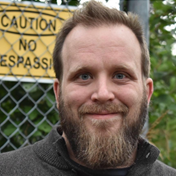Matt Ralph

In 2008, I was diagnosed with a brain tumour, a malignant ganglioglioma, after suffering a seizure — the first of many that I’ve suffered. I was 22 and was living with a girlfriend in Fredericton, but chose to follow Bob Dylan’s east coast tour to Newfoundland, my home, where I chose to have surgery, so that I could have family support.
My first surgery went extremely smoothly, and no further treatments were deemed necessary. My first request after getting out of the recovery room was for a large coffee, a good indication that I was doing fine. My time in the hospital was spent reading and following the news, where Ted Kennedy had just been released with a glioblastoma.
My initial emotional and intellectual response was one of disconnected curiosity than of fear or anger or anxiety. I regarded my new diagnosis as something that came with some privilege — brain cancer is a rare and fascinating experience. It was meaningful for me to be able to understand an experience that most people don’t until later in life. When my oncologist shared some statistics — 1 in 3 survivors after 5 years — my first thought was “too bad for the other 2 poor sods.”
Further links or information:
Twitter: @canadianpharaoh
Big Cancer Hook-up special guest: Matt Ralph
I had not in 5 years met another single cancer survivor in my age group.
I felt extremely isolated and felt that this was a need to be filled. That need was filled by Young Adult Cancer Canada (YACC) (and later, in a smaller way, by the Brain Tumour Foundation of Canada.) I participated in YACC’s “Retreat Yourself” weekend that summer, and it was a life-changer. I truly connected for the first time. I felt that I belonged and was understood, and I feel that I made friends for life. This has been re-established each year through YACC’s annual conferences and through its social media presence.
After my initial diagnosis of brain cancer, and despite having developed an interest in the history and science of cancer and devouring Siddhartha Mukherjee’s history ‘The Emperor of All Maladies,’ I was eager to get back to life.
I tried continuing university but found myself unhappy and disinterested. My relationship fell apart, and I became antisocial. Eventually, I returned home and reassessed my life. By the spring of 2013, I knew that cancer had taught me to focus on my long-term interests and passions, and so I applied for a BFA program in acting. But that year soon became a dramatic one. My grandmother died of cancer in July of that year. I returned to school for my first semester in September. But in early October, I was told that my own tumour was growing. My second brain surgery took place in November of 2013. This time, I didn’t have the wide-eyed curiosity or wonder of a brand new experience. Following the stress and trauma of my grandmother’s death, I felt emotionally spent and exhausted. A week after my surgery, I suffered a partial stroke, a complication, which left me with a permanent speech disability called anomic aphasia — an enormous disadvantage for would-be actors. After intensive radiation treatment in 2014, I returned to the acting program, where I struggled immensely, due to aphasia and to the effects of brain fog and radiation therapy.
Ten years after my initial diagnosis, I am still struggling, but in new ways.
An avid reader my entire life who averaged two books a week throughout my 20s, I’ve reached a point where I’m barely able to complete a book every other week. I attribute these difficulties with attention, focus, and short periods to my brain being unable to process written language (because of the cancer and the treatments). The lack of this comfort that has always helped me feel grounded has impacted my self-identity in a negative way. I worry about my future in terms of career and employment.
My cancer is very likely to return but hasn’t yet.
I think about what I might decide to do when it does. When my grandmother had a terminal diagnosis, she wanted her treatments prolonged in order to see her grandchildren graduate. For me, I’d skip the treatment and try to travel.
My relationship with cancer remains unusual, I believe.
I share grief when I lose family, friends, and loved ones to cancer. But I feel uncomfortable when people say things like “I hate cancer.” Cancer doesn’t feel invasive to me. Genetically, it’s something that most of us are born with. It’s ancient and more ‘human’ than any illness. I take comfort in feeling that my cancer is a part of me, every bit as much as my voice, my eyes, or my hands. I’m perhaps overly stoic or philosophical about death. To me, the world is overpopulated as is — if cancer takes me, then maybe it means it’s part of my job to make space for someone new.